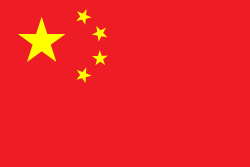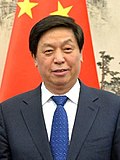| Chairman of the Standing Committee of the National People's Congress | |
|---|---|
| 全国人民代表大会常务委员会委员长 | |
 | |
 | |
| Standing Committee of the National People's Congress | |
| Type | Presiding officer |
| Status | National-level official |
| Member of | Council of Chairpersons |
| Nominator | Presidium of the National People's Congress |
| Appointer | National People's Congress |
| Term length | 5 years, renewable once consecutively |
| Constituting instrument | Constitution of China |
| Formation | 27 September 1954 |
| First holder | Liu Shaoqi |
| Deputy | Vice Chairpersons Secretary-General |
| Salary | CN¥150,000 per annum est. (2015) [1] |
| Website | www.npc.gov.cn |
| Chairman of the Standing Committee of the National People's Congress | |||||||
|---|---|---|---|---|---|---|---|
| Simplified Chinese | 全国人民代表大会常务委员会委员长 | ||||||
| Traditional Chinese | 全國人民代表大會常務委員會委員長 | ||||||
| |||||||
| Officially abbreviated as | |||||||
| Simplified Chinese | 全国人大常委会委员长 | ||||||
| Traditional Chinese | 全國人大常委會委員長 | ||||||
| |||||||
 |
|---|
The chairman of the Standing Committee of the National People's Congress is the presiding officer of the Standing Committee of the National People's Congress (NPCSC), which is the permanent body of the National People's Congress (NPC), the supreme state organ of power of the People's Republic of China.
Contents
The chairman is formally nominated by the Presidium of the NPC during a session and approved by the delegations of the NPC, though in reality is chosen within the ruling Chinese Communist Party (CCP). [2] The chairman presides over the work of the NPCSC and convenes and presides over its meetings. The chairman is assisted by the vice chairpersons and secretary-general of the NPCSC, who together makeup the Council of Chairpersons. [3] A vice chairperson may be delegated to exercise some of the chairman's powers by the chairman. In the case that the chairman becomes incapacitated, NPCSC temporarily elects one of the vice chairpersons until the chairman is able to resume their work or a new chairman is elected by the NPC. [4] The position holds reserve constitutional powers under the 1982 revision of the Constitution of China. As stipulated in Article 84 of the Constitution, should both the president and vice president become incapacitated, and the National People's Congress is unable to elect a timely replacement, the chairman of the NPCSC will act as president. [5] The chairman leads the Leading Party Members Group of the NPCSC, which is responsible for the implementation of CCP Central Committee policies in the NPCSC. [6]
From 1998 to 2013, the position was ranked second in the hierarchy of the Politburo Standing Committee of the CCP, since Li Peng was barred from seeking a third term as premier in 1998. In the political order of precedence, the chairman ranks below the CCP general secretary (paramount leader) and president (state representative). [7] The ranking of this position is not necessarily reflective of its actual power, which varies depending on the officeholder. The incumbent chairman is Zhao Leji, who is the third-ranking member of the Politburo Standing Committee.










